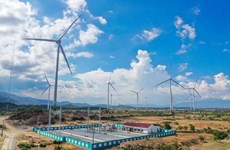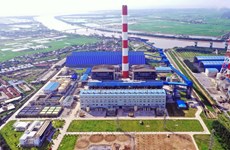Nomura forecasts VN's GDP growth at 4.9 percent
The Nomura International group has forecast Vietnam ’s GDP growth rate in 2009
to reach 4.9 percent, an increase over the group’s previous forecast of 4
percent, said the Vietnam Economic Times on July 9.
The Nomura International group has forecast Vietnam ’s GDP growth rate in 2009
to reach 4.9 percent, an increase over the group’s previous forecast of 4
percent, said the Vietnam Economic Times on July 9.
The group also predicted the country’s GDP growth rate for 2010 at 6.4 percent as compared with its previous 6 percent figure.
The group’s analysts announced the optimistic assessment of Vietnam ’s economic recovery in a report released on July 3, which was based on data published by Vietnam for the first six months of 2009.
The reports underlined the strong increase of Vietnam ’s GDP, from 3.1 percent in the first quarter of 2009 to 4.5 percent in the second quarter, fuelled by the growth of the industry and services sectors.
The industry sector, contributing 40 percent of the GDP, recorded a surge from 1.5 percent in the first quarter to 4.3 percent in the second. The services sector also increased from 5.4 percent to 5.9.
The Nomura group concluded that Vietnam ’s monetary and fiscal policies and its interest rate subsidisation policies have well supported its economic development.
Managing Director of the Small Enterprise Assistance Fund in Vietnam , Keirn O’ Connor, shared this view, saying that small and medium-sized enterprises have shown satisfactory performance in recent months.
The recovery of the domestic securities and realty markets also played a part in the rise, and in boosting confidence in the economy, O’Connor said.
The Government Office, in its report of the country’s socio-economic development in the first six months of 2009, which was released on July 7, said that “ Vietnam ’s economy only slowed down, but did not fall into recession and has already started to recover.”
According to the report, total social investment in the first half of 2009 was 322.6 trillion VND, up by 18.1 percent year-on-year. In the period, the country saw 37,000 newly-registered businesses.
However, the Nomura group’s analysts also warned that budget overspending in 2009, which is expected to be higher than in previous years, and the interest rate subsidisation programme are among issues of concern.
According to the group’s analysts, the interest rate subsidisation programme has had an affect but some borrowers used bank loans to invest in the stock and real estate markets, and though the State Bank of Vietnam (SBV) said they are making concerted efforts to control subsidised loans, there remains the risk of soft loans misuse.
In addition, according to O’ Connor, the US and European markets have not been recovering as expected, providing another challenge for the country in increasing its exports.
The Vietnamese government should pay attention to using economic levers, maintaining the stability of foreign currency reserves and the value of the Vietnamese dong, O’Connor suggested./.
The group also predicted the country’s GDP growth rate for 2010 at 6.4 percent as compared with its previous 6 percent figure.
The group’s analysts announced the optimistic assessment of Vietnam ’s economic recovery in a report released on July 3, which was based on data published by Vietnam for the first six months of 2009.
The reports underlined the strong increase of Vietnam ’s GDP, from 3.1 percent in the first quarter of 2009 to 4.5 percent in the second quarter, fuelled by the growth of the industry and services sectors.
The industry sector, contributing 40 percent of the GDP, recorded a surge from 1.5 percent in the first quarter to 4.3 percent in the second. The services sector also increased from 5.4 percent to 5.9.
The Nomura group concluded that Vietnam ’s monetary and fiscal policies and its interest rate subsidisation policies have well supported its economic development.
Managing Director of the Small Enterprise Assistance Fund in Vietnam , Keirn O’ Connor, shared this view, saying that small and medium-sized enterprises have shown satisfactory performance in recent months.
The recovery of the domestic securities and realty markets also played a part in the rise, and in boosting confidence in the economy, O’Connor said.
The Government Office, in its report of the country’s socio-economic development in the first six months of 2009, which was released on July 7, said that “ Vietnam ’s economy only slowed down, but did not fall into recession and has already started to recover.”
According to the report, total social investment in the first half of 2009 was 322.6 trillion VND, up by 18.1 percent year-on-year. In the period, the country saw 37,000 newly-registered businesses.
However, the Nomura group’s analysts also warned that budget overspending in 2009, which is expected to be higher than in previous years, and the interest rate subsidisation programme are among issues of concern.
According to the group’s analysts, the interest rate subsidisation programme has had an affect but some borrowers used bank loans to invest in the stock and real estate markets, and though the State Bank of Vietnam (SBV) said they are making concerted efforts to control subsidised loans, there remains the risk of soft loans misuse.
In addition, according to O’ Connor, the US and European markets have not been recovering as expected, providing another challenge for the country in increasing its exports.
The Vietnamese government should pay attention to using economic levers, maintaining the stability of foreign currency reserves and the value of the Vietnamese dong, O’Connor suggested./.












